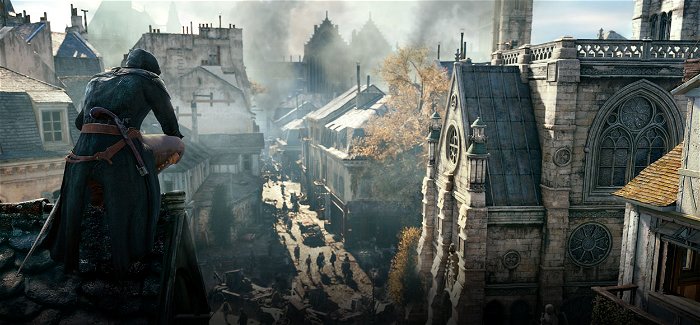The NPD sales figures in the USA came in for the month of November, and the results are pretty much what you’d expect, both good and bad. Call of Duty, of course, came in at #1, while Assassin’s Creed: Unity still managed to crack the top ten at #9. Dragon Age: Inquisition, which has already won a Game of the Year from the inaugural Game Awards, and is sure to easily win RPG of the year awards from most outlets, didn’t even make the chart. In other words, Assassin’s Creed, a game widely panned by both critics and disgruntled consumers for being broken was rewarded with sales in the millions, while a game that redeemed a franchise and is widely hailed as one of the best games of 2014 didn’t chart. Why did this happen?
There are a few theories, although two of them have historical precedent to contradict them. The first generic argument, especially when talking about the USA is, “Dragon Age isn’t a first-person shooter, and Americans only care about FPS games.” This argument evaporates when you look at the NPD sales for the last several years and see that Grand Theft Auto, which is not in first person, is one of the best-selling games of all time. Assassin’s Creed, which is NOT in first person, nor is it a shooter, regularly racks up monster sales in November going up against CoD. This year was no exception. And then of course, there are games like Guitar Hero which had no shooting or “view” whatsoever, except the fixed, traditional 2D view of all those gems falling down the screen. That game was a sales phenomenon for many years until oversaturation burned out the audience.

The argument, which almost holds water is, “It’s a big, epic RPG and Americans don’t like that kind of game.” This argument also falls apart when you dig out the history book of sales and see The Elder Scrolls V: Skyrim, Fallout III and The Elder Scrolls IV: Oblivion all staring you in the face, each one a massive sales hit for Bethesda. Even the first Mass Effect—which, to be fair, was a science fiction RPG/shooter hybrid—was a big hit for Microsoft when they published it.
So now that we know we can’t say “Americans only like first person shooters and hate RPGs, and the sales prove it,” we come right back to the original question. Why did Dragon Age: Inquisition not sell?
The two main culprits are the old business factors of competition and marketing. Inquisition was fighting a two front war on its release. The biggest factor, competition, is the old “sent out to die” argument people bring up whenever less mainstream games are released in November, THE biggest month for gaming in the year. Usually only two titles emerge unscathed in November, the latest Call of Duty and the latest Assassin’s Creed. Inquisition was originally scheduled for the much less competitive month of October, when people with limited disposable incomes might think to themselves, “I can only buy one game this month, Dragon Age is the biggest one.” In November however, if you can only buy one game in that month, it’s probably going to be either CoD or AC. A few people will buy both, but very few would buy three titles, because only the idle rich would have both the money AND the time required to play all of them.
The other reason is, of course, marketing. Call of Duty is Activision’s flagship title, and gets the lion’s share of a gigantic advertising campaign that sprawls CoD on any building, bus stop, TV commercial slot or Internet ad banner available. The same goes for Assassin’s Creed, which has supplanted all of Ubisoft’s Tom Clancy games to become its most important franchise, thereby enjoying a giant marketing budget to ram it down mainstream throats with signature cool, slo-mo trailer scored with whatever hip electronica track is fashionable from the last six months. Bethesda, as both developer and publisher made its name on the Elder Scrolls franchise, so once again that series enjoys flagship status with the marketing team when it comes to allocating cash. Dragon Age: Inquisition however, is a “smaller” franchise within Electronic Art’s massive stable of games, of which their sports titles like FIFA and Madden get the priority, with CoD wannabes like Battlefield also getting some love. BioWare may be a studio with some respectably high MetaCritic ratings, but their games don’t get the sales of annual FIFA release, and therefore aren’t going to get the same market saturation.
In the end, Dragon Age: Inquisition may have suffered in terms of initial launch sales, but that doesn’t mean the series is going to get cancelled. Obviously the fact that it has reviewed well will keep BioWare in EA’s good graces, even if they didn’t pull huge numbers. There’s also the fact that the RPG may have longer sales legs than something like Call of Duty. Just because people didn’t buy it in November, it doesn’t mean it won’t end up as a Christmas or birthday gift a few months from now, whereas Call of Duty gets the bulk of its sales at launch and not so much beyond that.

That doesn’t change the sad fact however, that in a time when most people are starved for a quality RPG, one came along, and it didn’t sell in great numbers despite no competition from either an Elder Scrolls or Witcher game. Maybe next time, BioWare.




